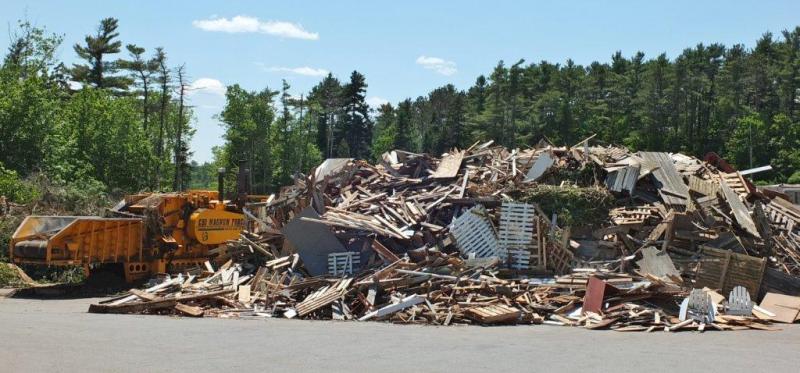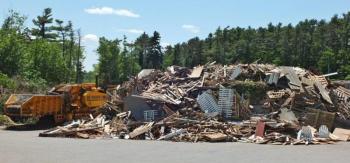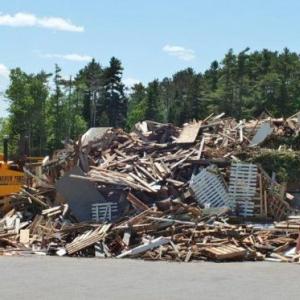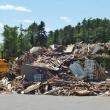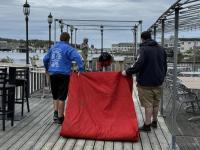How many woodchips can the district chuck?
The Boothbay Region Refuse Disposal District has a problem. A mountain of wood has piled up at the transfer station and there's no place to put it.
On June 7, Operations Manager Steve Lewis found out that the biomass plant in Livermore Falls is no longer accepting Boothbay's woodchips. This change led the district to stop processing wood recovered from construction materials (also known as demolition wood) at the Boothbay transfer station.
Over 200 tons of demolition wood has piled up in the past two weeks. Lewis said BRRDD will have to pay $18 per ton to send their woodchips to a landfill in Norridgewock if no solution is reached soon.
“Hopefully this is very short term. If it isn't, I don't know what we're going to do,” Lewis said.
Last year, 2,080 tons of demolition wood was ground up into woodchips, which BRRDD sold for $10 per ton to Livermore Falls. On average BRRDD makes $20,000 a year selling demolition woodchips; but, with the recent impasse Lewis said he is not looking forward to having to pay for woodchip removal, especially with the busy summer season approaching.
“You're talking 2,000 tons times $18. That's almost $40,000 it will cost to get rid of it,” Lewis said.
The standstill stems from a New York-based company called ReEnergy, which owns the Livermore Falls facility as well as several other biomass plants throughout New England.
ReEnergy decided to put a hold on accepting demolition woodchips from their Maine plants because of a recently signed Connecticut bill that became a law on June 5.
The law not only affected ReEnergy's stakes in Connecticut, but disallowed demolition material to be used as a fuel in generating renewable energy credits, which in turn affected Maine's facilities, said ReEnergy spokeswoman Sarah Boggess.
Renewable energy credits or “green tags” is what ReEnergy earns from the Maine plants that use woodchips as fuel to produce electricity. The green tags are environmental attributes from renewable energy projects, which can be sold, traded or bartered for, according to the U.S. Department of Energy.
ReEnergy is now submitting a petition to the public utilities regulatory commission to seek clarification of the new law, which could take 1 to 3 months to deliberate.
“Until we can get that clarification, we have stopped accepting waste from construction and demolition materials,” Boggess said.
While the Livermore Falls plant is still accepting Boothbay's “clean” woodchips from ground up trees and brush, the processing of demolition wood from construction has come to a grinding halt for most transfer stations in Midcoast and central Maine.
“We're hopeful that the circumstances will change. We've had a wonderful relationship with the refuse district for many years,” Boggess said.
The only other biomass plant remaining in the state that accepts the demolition woodchips is Sapi Fine Paper in Westbrook, but Sapi only services all the southern municipalities, and will not take on any new contracts, Lewis said.
The BRRDD currently services four towns in the Boothbay region (Boothbay, Boothbay Harbor, Edgecomb and Southport) and it accepts demolition wood from Wiscasset, Richmond, and Bath Iron Works for a fee.
Lewis said if a long-term solution isn't worked out soon, the BRRDD would have no choice but to start charging higher fees for outside towns and entities to use the facilities.
“You can't shut people off, but other towns on the other hand are going to have to pay for them,” Lewis said. “I have no other choice if they want to bring it here.”
Event Date
Address
United States

